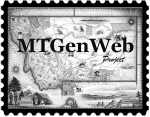Biographical Sketches
JOHN T. PARKISON
JOHN T. PARKISON, now of Boulder City, Jefferson county, and State of Montana, was born in Washington County, Pennsylvania, October 22, 1821. His grandfather, Joseph Parkison, was one of the early settlers of western Pennsylvania, was a soldier in the Revolutionary war, and was a Commissary at Valley Forge. After the war he settled on the Monongahela river at a place afterward called Parkison's Ferry; he laid off a town and called it Monogahela City, where he died, at the age of 108 years; his wife departed this life at the age of ninety-seven years. They had four children. William Parkison, the father of our subject, was born at Parkison's Ferry about 1780, married Susan Wells, a native of Virginia, and they continued to reside at Parkison's Ferry for some years, carrying on glass-works and merchandising. Mr. Wm. Parkison was a sutler or commissary under Gen. William Henry Harrison; also his brother-in-law, Major Warne, was a Major in the same campaign, which was an Indian war that Gen. Harrison was engaged in at the time.
After the death of Mr. Parkison, his widow returned to Virginia, with her three youngest children. Their family consisted of eight children, but at that time the older ones were grown.
John T. Parkison, the subject of this sketch, remained in Virginia until fifteen years of age, then went to Tennessee, and later to Texas, in the year 1842, while General Sam Houston, was president of that country, left Texas in 1843, spent a short time in Louisiana, and from that State went to St. Louis, Missouri, where he and his brother, William H. Parkison, engaged in steamboating, and together were interested in some seven or eight steamboats, his brother serving as captain, himself as pilot. In 1852 he went to California, during the gold excitement; went overland and was about six months making the trip; returned in 1854 and went to steamboating; remained on the river until July, 1858, then went to what is now known as Denver city. His brother, himself and others, laid off what is now known as Denver city, called after General James W. Denver, who was at that time Governor of Kansas. His brother and himself located two ranches adjoining the city of Denver and farmed them, raising the first crop in Colorado, also built one of the first brick business houses in Denver, which was built for a post office.
Mr. Parkison had made the trip to Montana and returned in 1863, and in the following year he located at Alder Gulch, this State, where he and his brother opened a store, they having brought three large trains of merchandise from Denver. One year later when gold was discovered in Last Chance Gulch, the brothers moved their store to Helena. While there they became the owners of large numbers of cattle, horses and mules, which they kept in Boulder valley. After selling their stock, they purchased teams and engaged in freighting between Milk river and Fort Benton. They disposed of their store in Helena in the fall of 1865, and engaged in mining in Confederate Gulch, White's Gulch and Grizzly Gulch, but during their operations at different places lost considerable money. They next embarked in placer and quartz mining in Boulder valley, which they continued for many years, and still own interests in various valuable mines. Mr. Parkison owned a store at Comet until 1893, but the mines having then shut down he closed his store and retired from active business.
Mr. Parkison has crossed the plains fourteen times to California, Colorado and Montana, forth and back, and since that time the great Western world has sprung into being, with its teeming multitudes of intelligent citizens and its great wealth. Had he still held his property in Denver he might now be many times a millionare. He is an intelligent and well informed citizen, has a wide acquaintance with the early settlers of Montana, and is highly esteemed by all who know him.
Source: Transcription from the book, An Illustrated History of the State of Montana, by Joaquin Miller, published in 1894; located on the website, Internet Archive (http://archive.org), accessed 12 May 2023.

